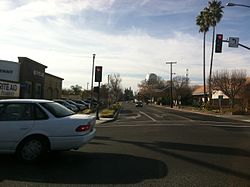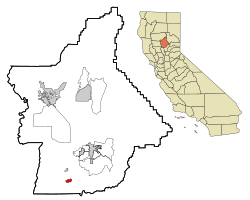Gridley, California
| City of Gridley | |
|---|---|
| City | |

Magnolia Street, off U.S. Route 99.
|
|
| Motto: "A small town that loves company" | |
 Location in Butte County and the state of California |
|
| Location in the United States | |
| Coordinates: 39°21′50″N 121°41′37″W / 39.36389°N 121.69361°WCoordinates: 39°21′50″N 121°41′37″W / 39.36389°N 121.69361°W | |
| Country |
|
| State |
|
| County | Butte |
| Incorporated | November 23, 1905 |
| Named for | George W. Gridley |
| Government | |
| • State Senator | Jim Nielsen (R) |
| • CA Assembly | James Gallagher (R) |
| • US Rep. | Doug LaMalfa (R) |
| Area | |
| • Total | 2.071 sq mi (5.364 km2) |
| • Land | 2.071 sq mi (5.364 km2) |
| • Water | 0 sq mi (0 km2) 0% |
| Elevation | 95 ft (29 m) |
| Population (April 1, 2010) | |
| • Total | 6,584 |
| • Estimate (2013) | 6,561 |
| • Density | 3,200/sq mi (1,200/km2) |
| Time zone | Pacific (UTC-8) |
| • Summer (DST) | PDT (UTC-7) |
| ZIP code | 95948 |
| Area code | 530 |
| FIPS code | 06-31260 |
| GNIS feature IDs | 277526, 2410665 |
| Website | www |
Gridley is a city in Butte County, California, United States. The estimated 2013 population was 6,561, up from 5,382 in 2000.
The town of Gridley was named after its founder and earliest landowner, George W. Gridley. He was born in the state of New York and later moved with his parents to Galena, Illinois. In 1850 (1850 census shows him living in Sacramento without his family), he attempted to drive sheep and cattle across the plains to California. He lost the animals, but arrived safely himself and settled in this area.
As early as 1852, he was prospering in the stock business, and with ten thousand dollars profit, he returned to Illinois. Again he started back to California with a large herd of sheep. This time, six hundred survived. That was enough to give George Gridley his start in the sheep raising business. He prospered in this venture, and his home ranch consisted of some 960 acres (3.9 km2) located West of Gridley. He married Helen Orcutt in 1846 in Illinois, and she joined him in California in 1855. The Gridleys had ten children. Mr. Gridley died at the home ranch on 9 March 1881, Mrs. Gridley twenty years later, 1 August 1901. Descendants of the Gridley family are still living in the area today.
With the decline of mining, agriculture became a more stable and attractive business in the 1860s. The Central Pacific Railroad laid tracks from Oregon to Chico in 1865. The railroad completed its path to Gridley in 1870, and that is when the community of Gridley began to form. The principal products from the Gridley area were wool and sheep. Orchards, field crops, and cattle would soon follow. In 1896, the Libby, McNeil & Libby Cannery was established and became one of the largest peach canning operations in the world. However it stopped operation in 2001 and is still out of operation.
The first home and store in Gridley were built by L.C. Stone in 1874. Stone served as postmaster, the train depot and express agent, as well as a merchant. Wells Fargo & Co. opened its office in 1871 and soon other businesses followed suit.
Two large fires, one in 1884 and one in 1891, destroyed much of the original business district. The district rallied and rebuilt around 1900.
Much of the historic downtown district remains. "Silk Stocking Row" the many well-preserved turn-of-the-century homes on Hazel Street, was so named because during the Depression the only women who could afford silk stockings lived in these large Hazel Street homes.
...
Wikipedia

